Timeless Tales: The 10 Best Historical Movies to Transport You to the Past
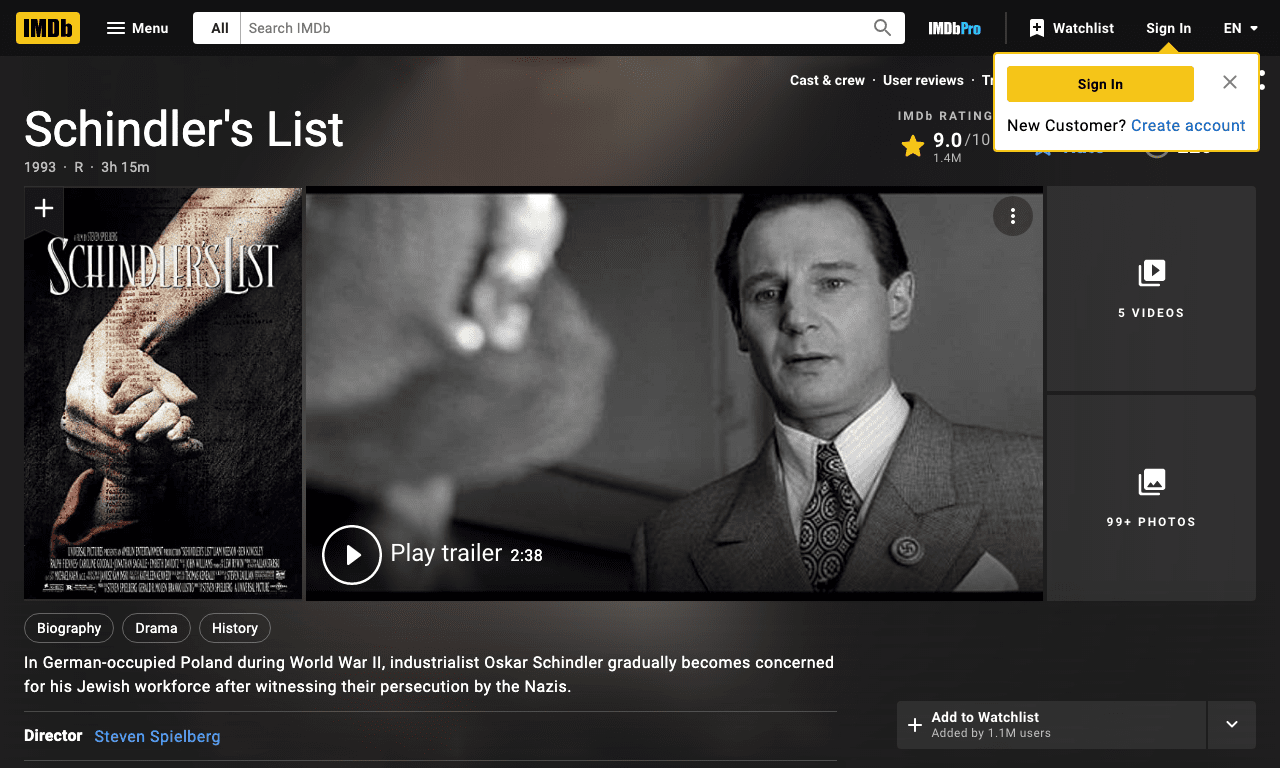
1. Schindler’s List
8.9/10
Schindler’s List is a 1993 American historical drama film directed and co-produced by Steven Spielberg. It is based on the true story of Oskar Schindler, a German businessman who saved the lives of more than a thousand Jewish refugees during the Holocaust by employing them in his factories.
Pros
- The film provides a powerful and emotional portrayal of the horrors of the Holocaust, reminding viewers of the atrocities committed during that time.
- The performances in the movie, especially by Liam Neeson as Oskar Schindler and Ralph Fiennes as Amon Goeth, are exceptional and add depth to the characters.
Cons
- The film’s lengthy runtime of over three hours may be challenging for some viewers who prefer shorter movies.
- The disturbing and violent nature of the film may be difficult for some audience members to watch.
Conclusion: Schindler’s List is a highly acclaimed film that provides a powerful and emotional portrayal of the Holocaust. Despite its lengthy runtime and intense subject matter, it is a must-watch for those interested in history and the human capacity for good in the face of evil.
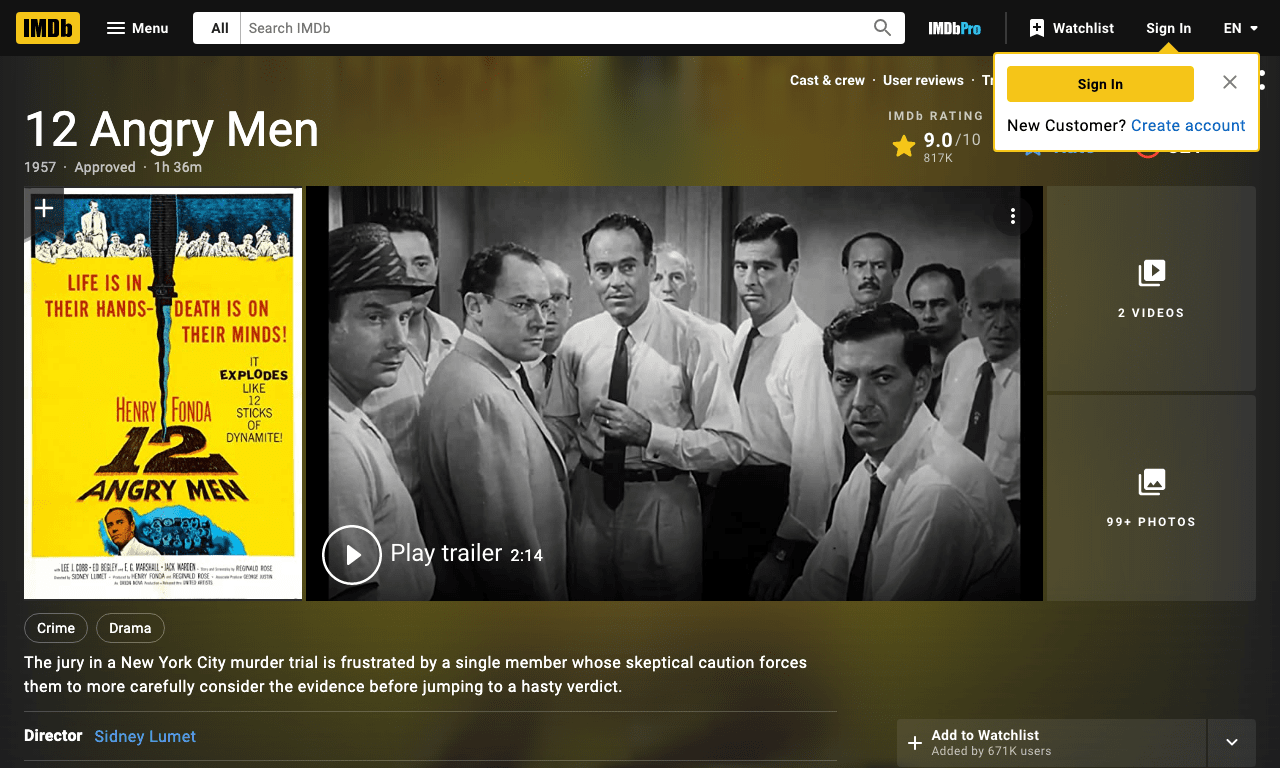
2. 12 Angry Men
8.9/10
12 Angry Men is a 1957 American courtroom drama film directed by Sidney Lumet. The story revolves around a jury of 12 men who are tasked with deciding the fate of a young man accused of murder. As the deliberations unfold, tensions rise, prejudices are exposed, and the characters’ inner conflicts come to the surface. Shot almost entirely in a single room, the film is a powerful examination of justice, prejudice, and the power of persuasion.
Pros
- Powerful performances: The film features an ensemble cast of talented actors who deliver exceptional performances, bringing the characters to life and adding depth to the story.
- Intense and gripping: The film builds tension throughout its runtime, keeping the audience on the edge of their seats as the jurors debate and argue over the evidence presented in the case.
Cons
- Slow pacing: Some viewers may find the deliberate pacing of the film’s conversations and deliberations to be slow and tiresome, especially if they prefer more fast-paced storytelling.
- Limited setting: The majority of the film takes place in a single room, which may not appeal to those who prefer a more visually dynamic or varied setting.
Conclusion: 12 Angry Men is a classic film that explores themes of justice, prejudice, and the power of persuasion. With its powerful performances and intense storytelling, it remains a timeless and thought-provoking masterpiece.
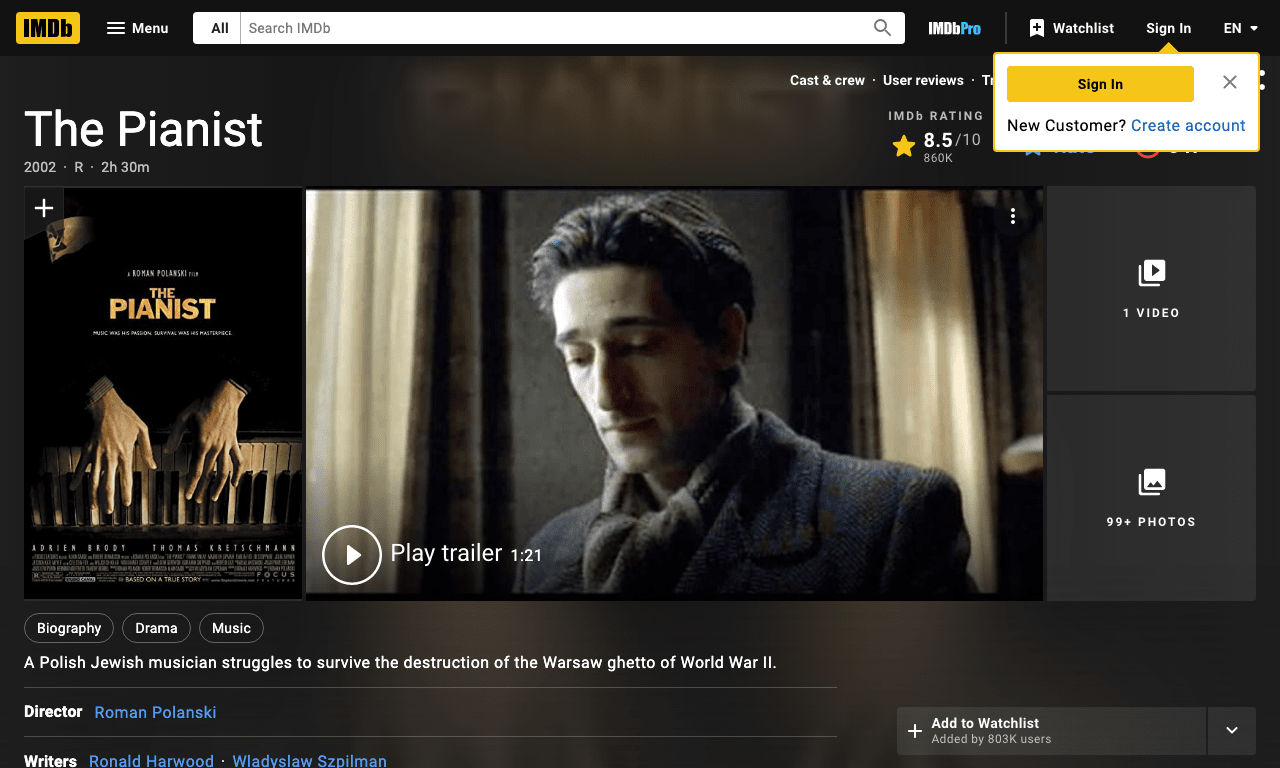
3. The Pianist
8.5/10
The Pianist is a critically acclaimed biographical drama film directed by Roman Polanski. It is based on the memoir of the same name by Władysław Szpilman, a Polish-Jewish pianist who witnessed the horrors of the Holocaust in Warsaw during World War II. The film is a powerful and moving portrayal of survival, human resilience, and the destruction caused by war.
Pros
- The Pianist offers a gripping and authentic portrayal of the Holocaust, capturing the horrors and atrocities of the time period with great sensitivity.
- The performance of Adrien Brody as Władysław Szpilman is outstanding, earning him an Academy Award for Best Actor. His portrayal of the character’s emotions and struggles is captivating and deeply moving.
Cons
- The pacing of The Pianist can be slow at times, which may test the patience of some viewers.
- The film’s focus on the personal story of Władysław Szpilman may leave out some broader historical context, which could be disappointing for those looking for a more comprehensive depiction of the Holocaust.
Conclusion: The Pianist is a powerful and poignant film that tells the story of survival and resilience in the face of unimaginable horrors. It offers a haunting portrayal of the Holocaust and the indomitable spirit of an individual. While it may not be for everyone due to its slower pace and singular focus on a personal story, it is a must-watch for those interested in historical dramas and stories of human strength.
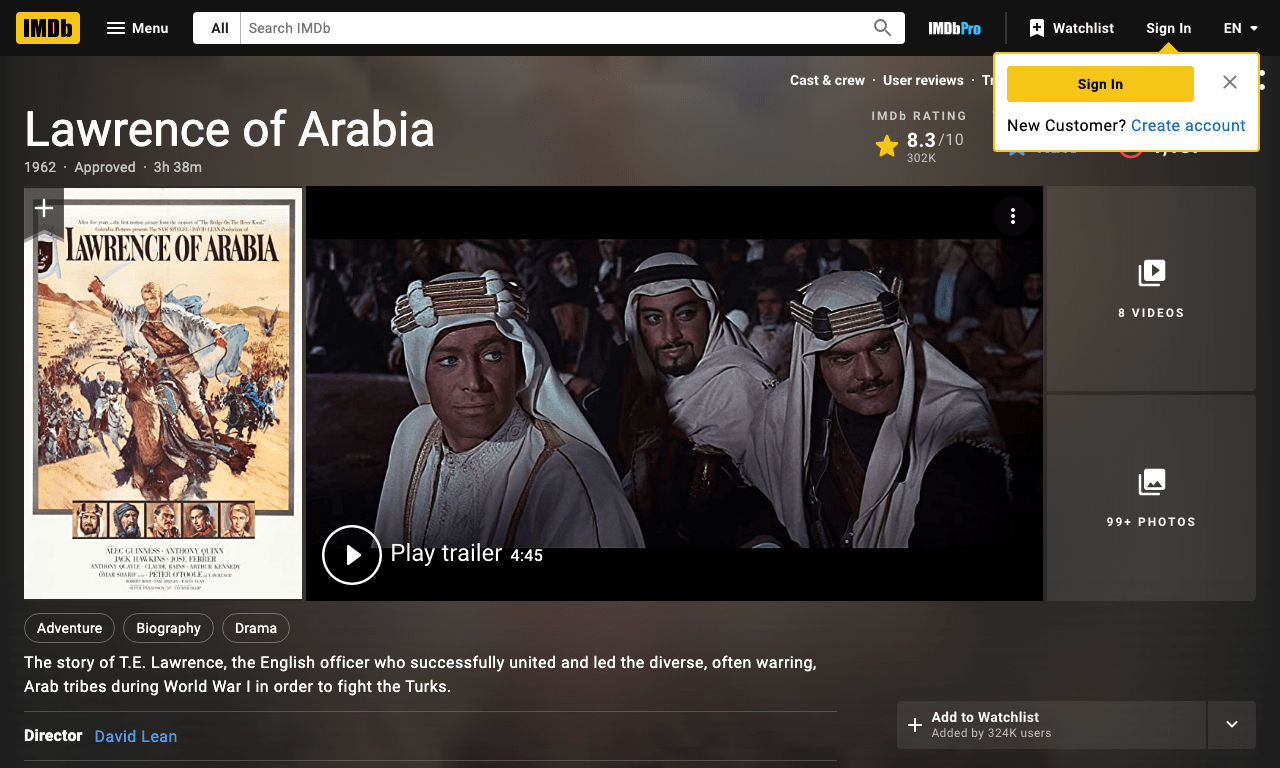
4. Lawrence of Arabia
8.3
Lawrence of Arabia is a historical drama film released in 1962. The movie is directed by David Lean and stars Peter O’Toole in the titular role. Set during World War I, the film tells the story of T. E. Lawrence, a British archaeologist who becomes a key figure in the Arab revolt against the Ottoman Empire. With stunning cinematography, a compelling storyline, and exceptional performances, Lawrence of Arabia is considered a cinematic masterpiece.
Pros
- 1. Epic Scale: Lawrence of Arabia is known for its grand scale and sweeping cinematography. The film captures the vastness of the desert landscapes and the intensity of the battles, creating a visually stunning experience for the audience.
- 2. Peter O’Toole’s Performance: Peter O’Toole delivers a captivating performance as T. E. Lawrence, bringing depth and complexity to the character. His portrayal of Lawrence earned him critical acclaim and is considered one of the greatest performances in film history.
Cons
- 1. Length: At a runtime of over three hours, Lawrence of Arabia can feel a bit long and slow-paced for some viewers. The film requires patience and may not be suitable for those seeking fast-paced action.
- 2. Complex Narrative: The film’s plot can be intricate and challenging to follow at times. The historical and political context may require prior knowledge or additional research to fully understand and appreciate the story.
Conclusion: Lawrence of Arabia is a timeless classic that showcases the brilliance of David Lean’s direction and Peter O’Toole’s performance. Despite its lengthy runtime and complex narrative, the film’s epic scale and compelling story make it a must-watch for any cinema lover. It remains one of the most influential and celebrated films in cinematic history.
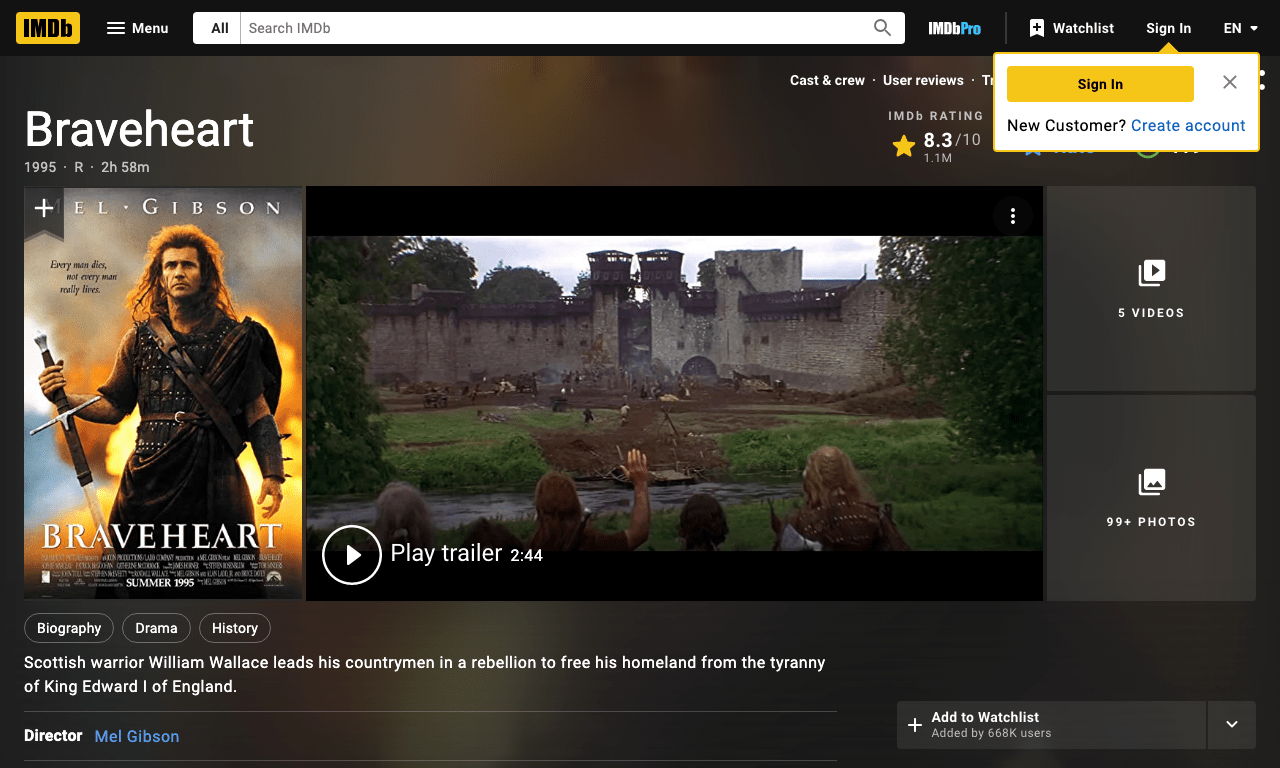
5. Braveheart
8.3/10
Braveheart is a 1995 historical war epic film directed by Mel Gibson. It follows the story of William Wallace, a Scottish warrior who leads a rebellion against King Edward I of England during the First War of Scottish Independence. The film explores themes of freedom, patriotism, and sacrifice, as Wallace fights for the independence of Scotland.
Pros
- Epic and powerful storytelling
- Strong performances, particularly by Mel Gibson as William Wallace
Cons
- Historical inaccuracies
- Some viewers may find the violence and gore excessive
Conclusion: Braveheart is a gripping and emotional film that showcases the struggle for freedom and the power of the human spirit. While it may not be entirely historically accurate, it remains a highly entertaining and impactful movie. With a stellar performance by Mel Gibson and sweeping cinematography, Braveheart is a must-watch for fans of historical dramas and epic war films.
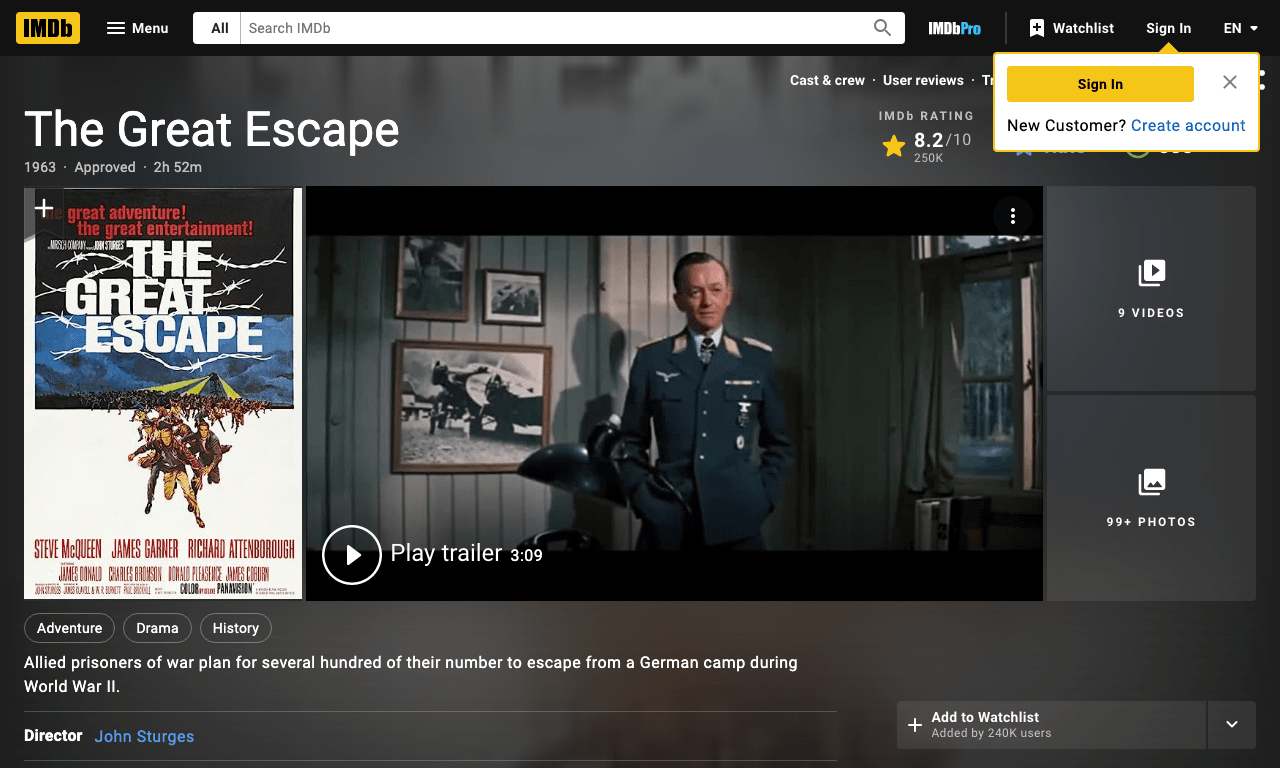
6. The Great Escape
8.2/10
The Great Escape is a 1963 American war film based on the true story of a massive escape by British Commonwealth prisoners of war from a German POW camp during World War II. The film depicts the planning, execution, and aftermath of the escape, which became one of the most legendary events of the war.
Pros
- Outstanding cast: The Great Escape boasts an ensemble of renowned actors, including Steve McQueen, James Garner, and Richard Attenborough. Their performances bring depth and authenticity to the characters, enhancing the overall viewing experience.
- Riveting storyline: The film successfully captures the tension and excitement of the escape plan. The audience is kept on the edge of their seats, eagerly anticipating the prisoners’ every move as they attempt to outsmart their captors.
Cons
- Lengthy runtime: The Great Escape has a runtime of 172 minutes, which may be a bit long for some viewers. However, the captivating story and engaging performances make the film worth the investment of time.
- Historical inaccuracies: While the film is based on a true story, some events and characters have been fictionalized for dramatic purposes. This may bother viewers looking for a strictly accurate portrayal of the actual events.
Conclusion: The Great Escape is a classic war film that continues to captivate audiences with its thrilling storyline and stellar performances. Despite its lengthy runtime and some historical inaccuracies, it remains a must-watch for fans of the genre.
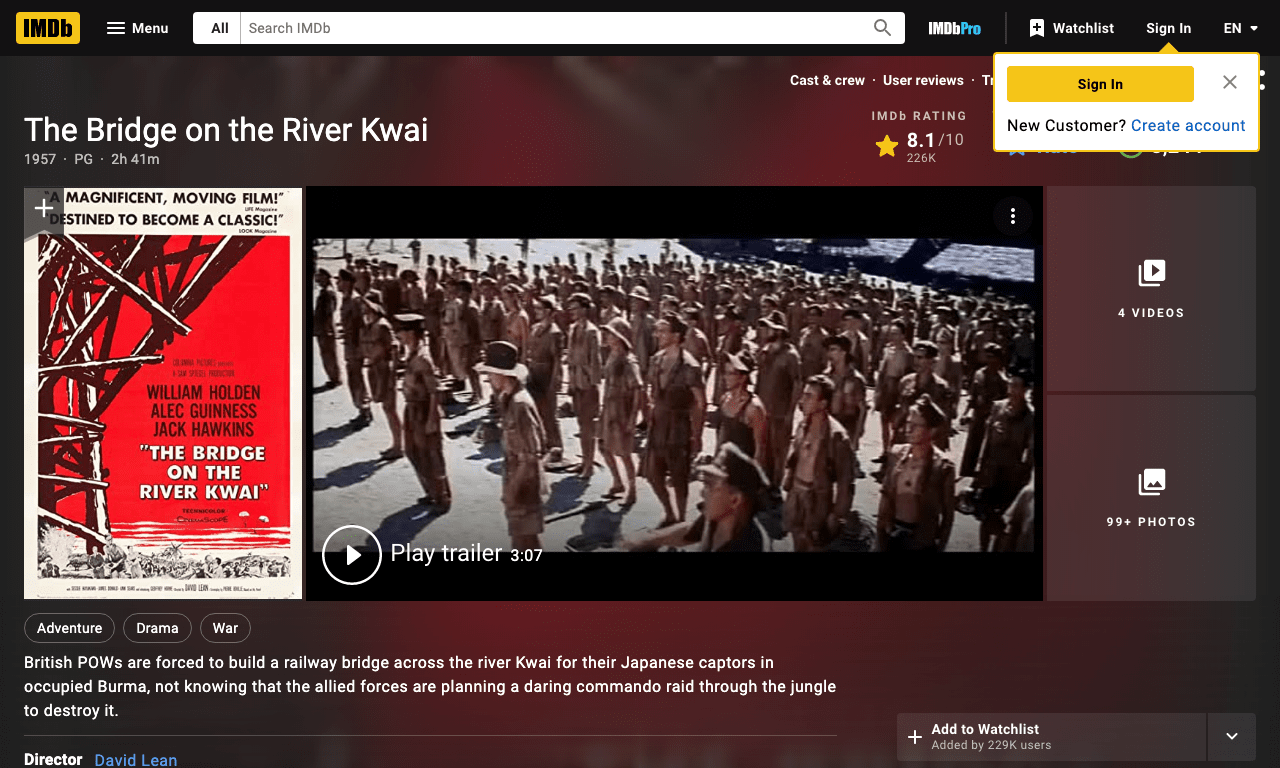
7. The Bridge on the River Kwai
8.1/10
The Bridge on the River Kwai is a 1957 epic war film directed by David Lean and based on the novel of the same name by Pierre Boulle. Set during World War II, the film tells the story of British prisoners of war tasked with building a bridge over the River Kwai in Burma, while unknowingly assisting the Japanese war effort. The movie stars William Holden, Alec Guinness, Jack Hawkins, and Sessue Hayakawa, and is known for its powerful performances, stunning cinematography, and thought-provoking themes.
Pros
- Strong performances: The film features outstanding performances from its cast, particularly Alec Guinness as Colonel Nicholson. Guinness brings depth and complexity to his character and delivers a memorable performance that earned him an Academy Award for Best Actor.
- Visually stunning: The Bridge on the River Kwai showcases David Lean’s masterful direction and the beautiful cinematography of Jack Hildyard. The film’s lush jungle landscapes and meticulously crafted sets create a visually captivating experience for viewers.
Cons
- Pacing issues: Some viewers may find the film’s pacing to be slower, especially in the first half. The focus on the building of the bridge and the intricate details of the characters’ relationships may not appeal to those seeking more action-oriented war films.
- Historical inaccuracies: While the film is based on true events, it takes several liberties with historical accuracy for the purpose of storytelling. Some viewers may find these inaccuracies distracting or misleading.
Conclusion: The Bridge on the River Kwai is a classic war film that explores themes of duty, honor, and the futility of war. With its stellar performances, breathtaking visuals, and thought-provoking narrative, it remains a must-watch for cinephiles and history buffs alike.
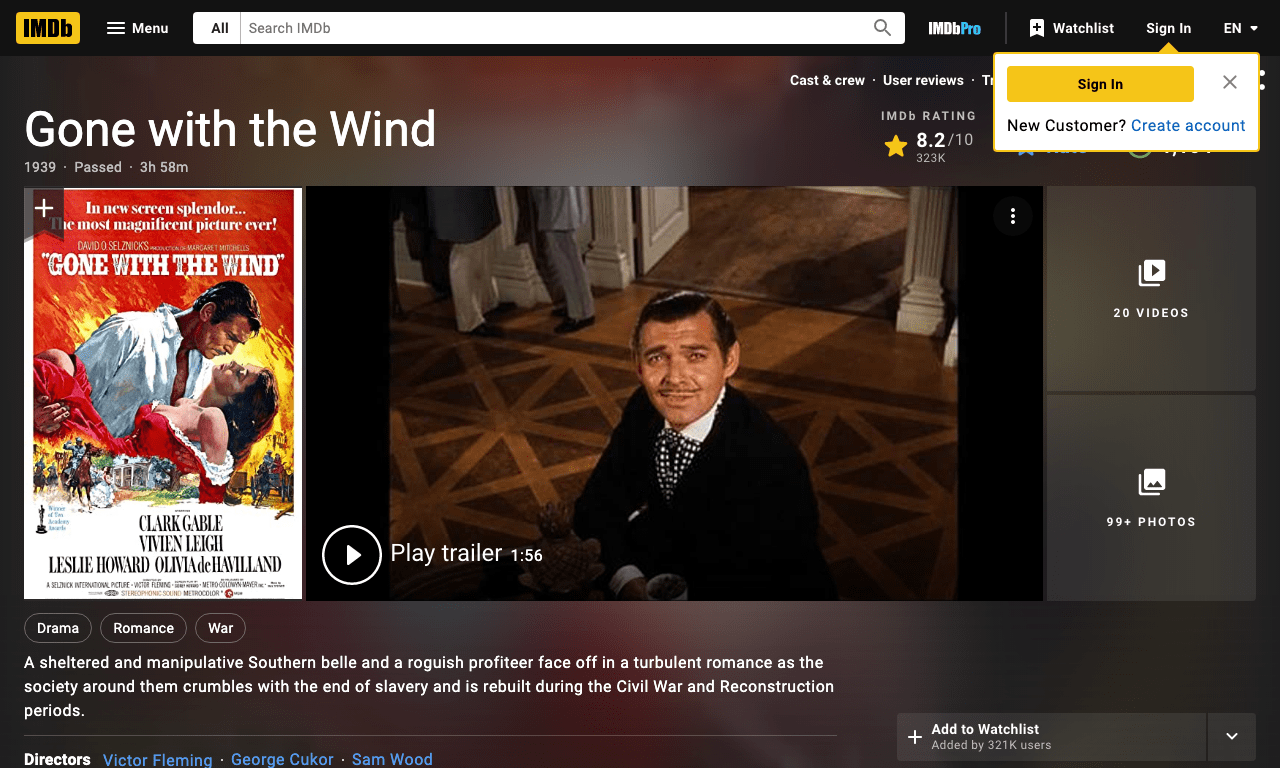
8. Gone with the Wind
8.1/10
Gone with the Wind is a classic American film released in 1939 based on Margaret Mitchell’s novel of the same name. Set in the backdrop of the American Civil War and Reconstruction era, the film tells the story of Scarlett O’Hara, a strong-willed Southern belle. It explores themes of love, sacrifice, and the impact of war on society. With its epic scope, memorable characters, and stunning visuals, Gone with the Wind has stood the test of time as one of the greatest films ever made.
Pros
- The film features exceptional performances by the cast, especially Vivien Leigh as Scarlett O’Hara and Clark Gable as Rhett Butler. Their chemistry and portrayal of complex characters elevate the film.
- Gone with the Wind showcases breathtaking cinematography and production design. The grandeur of the settings, costumes, and visual effects transport viewers to the Antebellum South.
Cons
- The film has received criticism for its depiction of slavery and its romanticizing of the Old South. Some argue that it glosses over the harsh realities of the time period and presents a distorted view of history.
- At almost four hours long, Gone with the Wind may be too lengthy for some viewers. The pacing can feel slow at times, making it a challenging watch for those with shorter attention spans.
Conclusion: Gone with the Wind is a cinematic masterpiece that continues to captivate audiences with its compelling story, memorable performances, and stunning visual imagery. While it has its flaws, the film remains an iconic piece of cinema history and a must-watch for anyone interested in classic films.
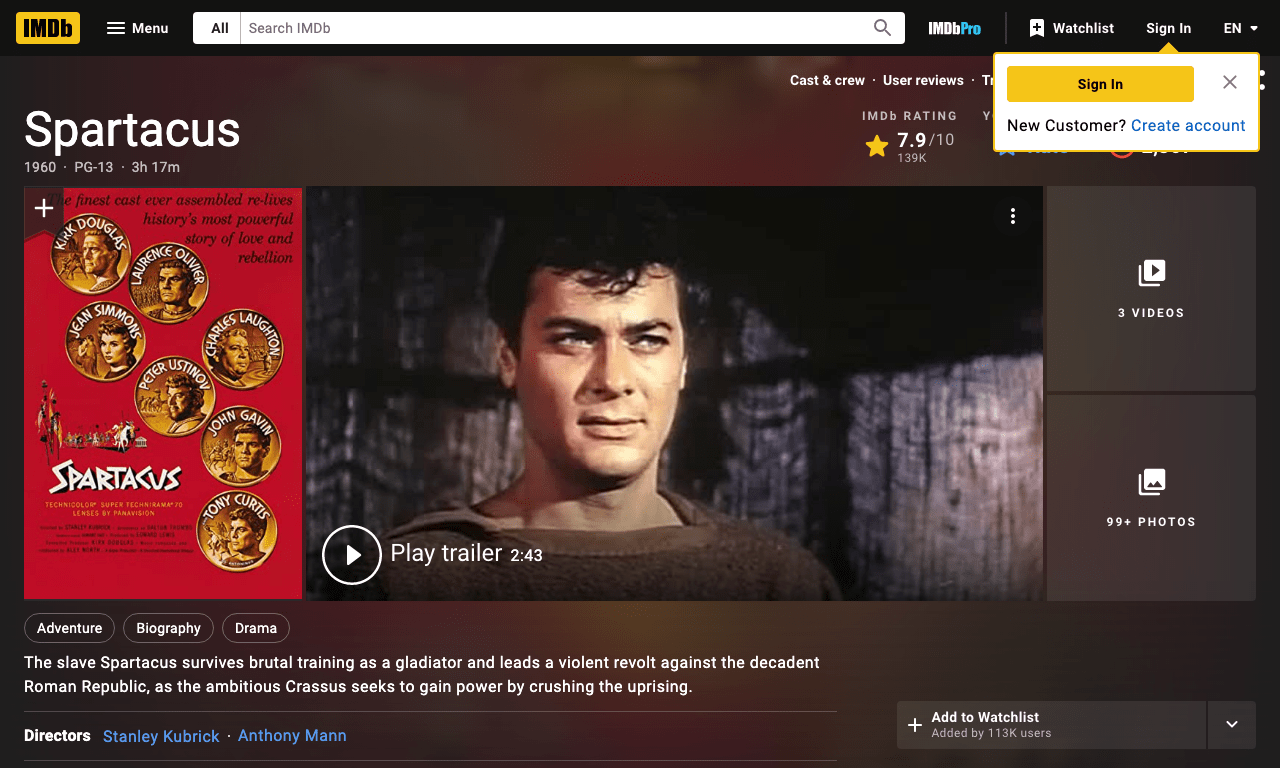
9. Spartacus
8.0/10
Spartacus is an epic historical drama film directed by Stanley Kubrick, released in 1960. The film is based on the novel of the same name by Howard Fast and tells the story of Spartacus, a Thracian gladiator who leads a slave revolt against the Roman Republic. The film stars Kirk Douglas in the title role, with Laurence Olivier, Jean Simmons, and Peter Ustinov in supporting roles. Spartacus is known for its grand spectacle and powerful performances, and has become a classic in the genre of historical epics.
Pros
- Ambitious and epic storytelling
- Strong performances, especially from Kirk Douglas and Laurence Olivier
Cons
- Lengthy runtime may be intimidating for some viewers
- Some historical inaccuracies
Conclusion: Spartacus is a classic film that continues to be beloved for its grand scale and powerful performances. While it may not be historically accurate in every aspect, it still provides an entertaining and engaging experience for viewers. With its epic storytelling and memorable characters, Spartacus is a must-watch for fans of historical dramas and epic films.
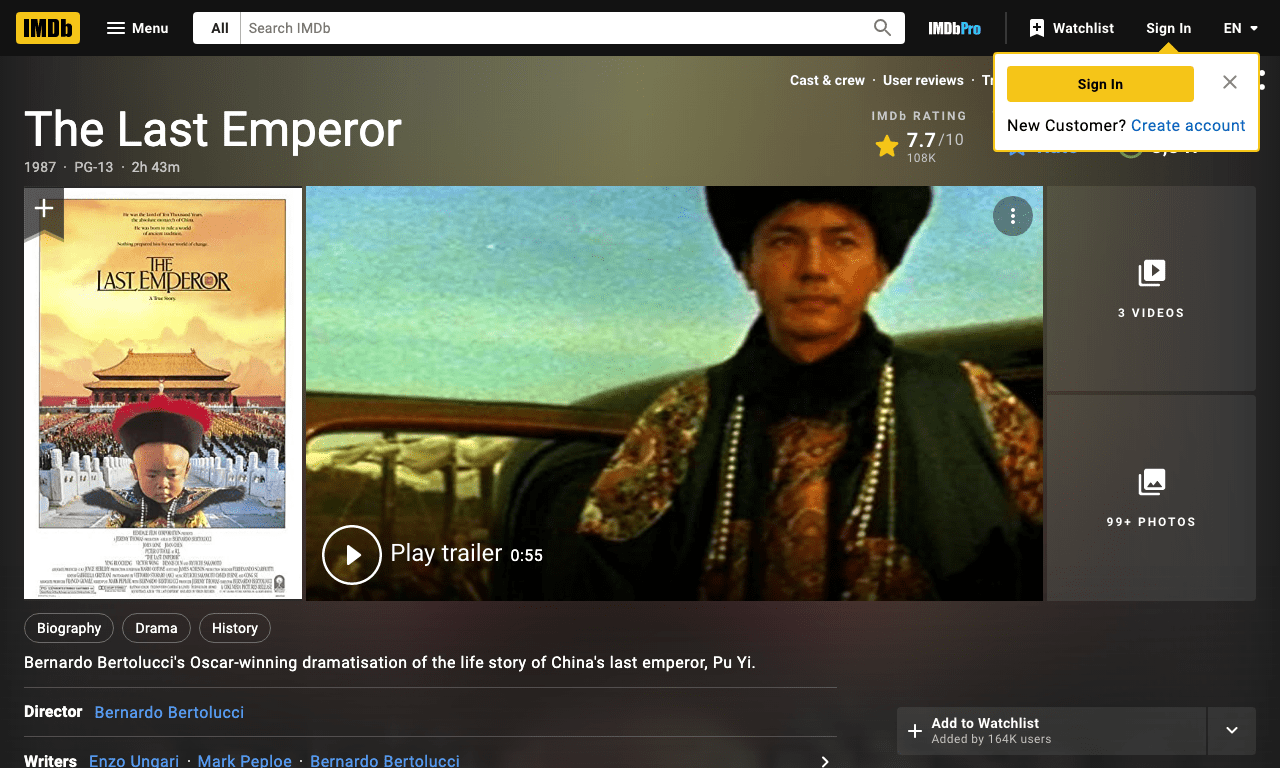
10. The Last Emperor
7.7/10
The Last Emperor is a historical drama film directed by Bernardo Bertolucci. The movie tells the story of Pu Yi, the last Emperor of China, and his life from his ascent to the throne as a child to his eventual downfall and exile. The film explores themes of power, identity, and the impact of political and societal change.
Pros
- The Last Emperor offers a visually stunning experience, with beautiful cinematography and lavish production design that captures the grandeur and opulence of the Chinese imperial court.
- The film provides a fascinating insight into the life of Pu Yi, a mysterious and complex figure who experienced tremendous personal and historical upheavals. It delves into his struggles with identity, power, and the shifting political landscape of China.
Cons
- The film’s slow pacing and lengthy runtime may be challenging for some viewers who prefer more fast-paced storytelling.
- While the film offers an immersive and detailed portrayal of Pu Yi’s life, some critics argue that it lacks emotional depth and fails to fully explore the character’s inner motivations.
Conclusion: The Last Emperor is a visually stunning and thought-provoking film that provides a glimpse into the tumultuous life of Pu Yi. While it may not be for everyone due to its pacing and lack of emotional depth, it remains an important work in the historical drama genre and a must-watch for those interested in Chinese history and culture.
